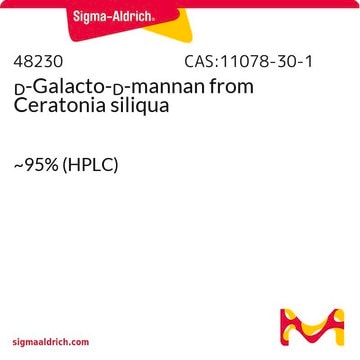G0753
Locust bean gum from Ceratonia siliqua seeds
Synonym(s):
Galactomannan polysaccharide, Gum, locust bean, Manno-galactan (main component)
Sign Into View Organizational & Contract Pricing
All Photos(2)
About This Item
Recommended Products
Application
Locust bean gum (LBG, galactomannan polysaccharide) from Ceratonia siliqua seeds may be used as a substrate to help identify, differentiate and characterize mannanase(s), such as the β-Mannanases (EC 3.2.1.78). LBG may be used in the development of drug delivery devices. LBG may be used to study its properties as a protective agent on both eucalyptus and microcrystalline cellulose destruction of crystallinity by ball milling. LBG may be used to study its properties as a food additive that reduces spoilage caused by Aspergillus flavus. LBG may be used as a starting material for the organic synthesis of hyperbranched N-glycan core structures.
Other Notes
Believed to be a straight chain polymer of mannose with one galactose branch on every fourth mannose and a M.W. of approx. 310 kDa.
To gain a comprehensive understanding of our extensive range of Oligosaccharides for your research, we encourage you to visit our Carbohydrates Category page.
Storage Class Code
11 - Combustible Solids
WGK
WGK 2
Flash Point(F)
Not applicable
Flash Point(C)
Not applicable
Personal Protective Equipment
dust mask type N95 (US), Eyeshields, Gloves
Choose from one of the most recent versions:
Certificates of Analysis (COA)
Lot/Batch Number
Don't see the Right Version?
If you require a particular version, you can look up a specific certificate by the Lot or Batch number.
Already Own This Product?
Find documentation for the products that you have recently purchased in the Document Library.
Customers Also Viewed
Do Young Kim et al.
Bioresource technology, 102(19), 9185-9192 (2011-07-20)
The gene (1272-bp) encoding a β-1,4-mannanase from a gut bacterium of Eisenia fetida, Cellulosimicrobium sp. strain HY-13 was cloned and expressed in Escherichia coli. The recombinant β-1,4-mannanase (rManH) was approximately 44.0 kDa and has a catalytic GH5 domain that is
Filip Mollerup et al.
Biochimica et biophysica acta, 1860(2), 354-362 (2015-11-01)
Galactose oxidase (GaO) selectively oxidizes the primary hydroxyl of galactose to a carbonyl, facilitating targeted chemical derivatization of galactose-containing polysaccharides, leading to renewable polymers with tailored physical and chemical properties. Here we investigate the impact of a family 29 glucomannan
Long Zou et al.
Food chemistry, 141(3), 2486-2494 (2013-07-23)
Response surface methodology (RSM) was applied to investigate the effects of lecithin (0-0.4 g/100 ml), monoacylglycerol (0-0.4 g/100 ml), locust bean gum (LBG; 0-0.1 g/100 ml), and carrageenan (0-0.02 g/100 ml) on the physical and oxidative properties of structured lipid-based
Luísa Custódio et al.
Plant foods for human nutrition (Dordrecht, Netherlands), 66(1), 78-84 (2011-03-15)
This work aimed to evaluate the phytochemical content and to determine the antioxidant and cytotoxic activities of methanol extracts of the carob tree (Ceratonia siliqua L.) germ flour. The extracts were rich in phenolic compounds, had considerable antioxidant activity, and
Maria Emília Lima-Costa et al.
Journal of industrial microbiology & biotechnology, 39(5), 789-797 (2012-01-25)
The waste materials from the carob processing industry are a potential resource for second-generation bioethanol production. These by-products are small carob kibbles with a high content of soluble sugars (45-50%). Batch and fed-batch Saccharomyces cerevisiae fermentations of high density sugar
Our team of scientists has experience in all areas of research including Life Science, Material Science, Chemical Synthesis, Chromatography, Analytical and many others.
Contact Technical Service









